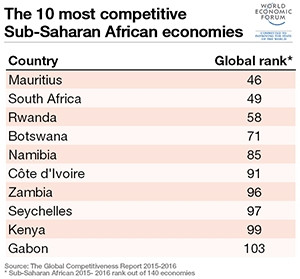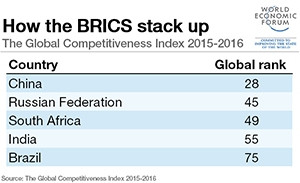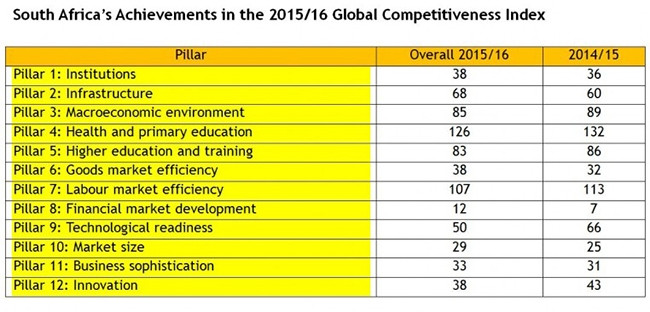
South Africa's global competitiveness is on the rise thanks to improvements in ICT and innovation. This is according to the World Economic Forum's (WEF's) latest annual Global Competitiveness Index, which saw SA rise seven places from number 56 last year, to 49 out of 140 countries listed in the 2015-2016 report.
The WEF report says SA reversed its four-year downward trend "thanks largely to increased uptake of ICTs ? especially higher Internet bandwidth ? and improvements in innovation (up by five places to 38th), which establish the economy as the region's most innovative".
South Africa ranks 50th in terms of technological readiness and 41st when looking at the availability of the latest technologies. In terms of overall ICT use, SA comes in 57th, and breaks into the top 20 at 19 when ranking Internet bandwidth. The country's capacity for innovation is 32nd best in the world but SA only comes 71st when looking at the number of Internet users.
South Africa also boasts the continent's most efficient financial market (12th), an efficient transport infrastructure (29th), and strong intellectual property protection (24th).
The WEF says Sub-Saharan Africa continues to grow at close to 5%, but competitiveness and productivity remain low.
"This is something countries in the region will have to work on, especially as they face volatile commodity prices, closer scrutiny from international investors and population growth.
"Mauritius remains the region's most competitive economy (46th), closely followed by South Africa (49th) and Rwanda (58th). C^ote d'Ivoire (91st) and Ethiopia (109th) excel as this year's largest improvers in the region overall."
Positives and negatives
Brand South Africa CEO Kingsley Makhubela is pleased with SA's rise up the rankings and says he looks forward to further improvements in the next year.

"Building a country's competitiveness is a collective endeavour involving the collaboration of government, business and civil society. Ultimately, it involves all South Africans to coalesce around this national objective."
He believes the results of the report show South Africa has made "significant improvements towards ensuring we are a globally competitive destination".
"The report resonates with our own assessment that we must work towards strengthening, among others, the education and health sectors to ensure our sustained competitiveness. The National Development Plan outlines the steps we need to take to achieve this," says Makhubela.
This as the report outlined unsatisfactory health (128th) and education (120th) outcomes as important challenges facing SA, along with "persistent inefficiencies in its labour market (107th)".
The report found that when looking at the quality of education in South Africa, "higher secondary enrolment rates will not be enough to create the skills needed for a competitive economy".

The country ranked at number 33 for the quality of scientific research institutions but only 106th when looking at the availability of scientists and engineers.
"The country also needs to address its inefficient electricity supply (116th)," according to the WEF.
"Reducing corruption (76th) and the burden of government regulation (117th), and improving the security situation (102nd) would further improve institutions."
The Global Competitiveness Report's competitiveness ranking is based on the Global Competitiveness Index (GCI), which was introduced by the WEF in 2004. Defining competitiveness as the set of institutions, policies and factors that determine the level of productivity of a country, GCI scores are calculated by drawing together country-level data covering 12 pillars of competitiveness.
The 12 pillars are: institutions, infrastructure, macro-economic environment, health and primary education, higher education and training, goods market efficiency, labour market efficiency, financial market development, technological readiness, market size, business sophistication, and innovation.

Share